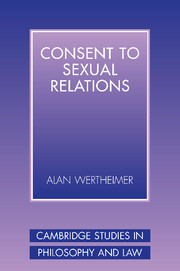Book contents
- Frontmatter
- Contents
- Preface
- Acknowledgments
- Abbreviations
- 1 Introduction
- 2 Law
- 3 The psychology of sex
- 4 The psychology of perpetrators
- 5 The harm and wrong of rape
- 6 The value of consent
- 7 The ontology of consent
- 8 Coercion
- 9 Deception
- 10 Competence
- 11 Intoxication
- 12 Sex and justice
- Appendix: Alphabetical list of hypothetical cases
- Index
5 - The harm and wrong of rape
Published online by Cambridge University Press: 04 March 2010
- Frontmatter
- Contents
- Preface
- Acknowledgments
- Abbreviations
- 1 Introduction
- 2 Law
- 3 The psychology of sex
- 4 The psychology of perpetrators
- 5 The harm and wrong of rape
- 6 The value of consent
- 7 The ontology of consent
- 8 Coercion
- 9 Deception
- 10 Competence
- 11 Intoxication
- 12 Sex and justice
- Appendix: Alphabetical list of hypothetical cases
- Index
Summary
Introduction
In this chapter I seek to understand the ways in which nonconsensual sexual relations are harmful or wrong. Harm and wrong are not identical. I begin with harm. This analysis will, of necessity, be philosophical as well as empirical. The question as to how women experience their victimization is, in principle, a straightforward empirical question, although our information may be quite incomplete. But the question of what constitutes the harm of rape or nonconsensual sexual relations is philosophical. In particular, we want to ask whether the harm to the victim is best understood as primarily experiential (or subjective) or whether it is best understood as objective (or moral). Deborah Rhode says, for example, that date rape “is no less harmful than other assaults, because it calls into question a woman's behavior, judgment, and sense of trust in ways that random acts by strangers do not.” Rhode may be right, but we cannot say without an account of harm.
Why ask the question? Given that rape is uncontroversially harmful and wrong, why do we need to know why rape is harmful? Purely philosophical concerns aside, if we were only interested in violent rape, we would not need to know – for violent rape is harmful and wrongful on any plausible view. But nonconsensual or marginally consensual sexual relations may be harmful on some accounts of harm and less harmful on others, or not harmful at all.
- Type
- Chapter
- Information
- Consent to Sexual Relations , pp. 89 - 118Publisher: Cambridge University PressPrint publication year: 2003



